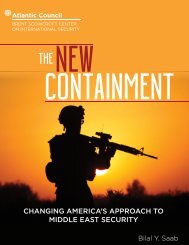POLITICS GOVERNANCE STATE-SOCIETY RELATIONS
Politics_Governance_and_State-Society_Relations_web_1121
Politics_Governance_and_State-Society_Relations_web_1121
You also want an ePaper? Increase the reach of your titles
YUMPU automatically turns print PDFs into web optimized ePapers that Google loves.
<strong>POLITICS</strong>, <strong>GOVERNANCE</strong>, AND <strong>STATE</strong>-<strong>SOCIETY</strong> <strong>RELATIONS</strong><br />
FOREWORD<br />
The Middle East is seeing a century-old political order unravel, an unprecedented struggle for power within<br />
and between states, and the rise of extremist elements that have already exacted a devastating human and<br />
economic toll that the world cannot continue to bear. That is why we, in partnership with the Atlantic Council,<br />
have undertaken a bipartisan effort to advance the public discussion in the direction of a global strategy for<br />
addressing these and other, longer-term challenges confronting the region.<br />
To that end, we convened in February 2015 a Middle East Strategy Task Force to examine the underlying issues<br />
of state failure and political legitimacy that contribute to extremist violence, and to suggest ways that the<br />
international community can work in true partnership with the people of the region to address these challenges.<br />
As Co-Chairs for this project, our emphasis is on developing a positive agenda that focuses not just on the<br />
problems of the region, but recognizes and seeks to harness its vast potential and empower its people.<br />
We have undertaken this effort together with a diverse and high-level group of senior advisers from the United<br />
States, Europe, and the Middle East, underscoring the truly international approach that is necessary to address<br />
this global problem and the need, first and foremost, to listen to responsible voices from the region. We<br />
approach this project with great humility, since the challenges facing the region are some of the most difficult<br />
that either of us has ever seen.<br />
Engaging some of the brightest minds in the region and beyond, we organized five working groups to examine<br />
the broad topical issues that we see as essential to unlocking a more peaceful and prosperous Middle East. These<br />
issues include:<br />
• Security and Public Order<br />
• Religion, Identity, and Countering Violent Extremism<br />
• Rebuilding Societies: Refugees, Recovery, and Reconciliation in times of Conflict<br />
• Politics, Governance, and State-Society Relations<br />
• Economic Recovery and Revitalization<br />
Over the course of 2015, each of these working groups discussed key aspects of the topic as they saw it,<br />
culminating in each case in a paper outlining the individual working group convener’s conclusions and<br />
recommendations based on these discussions. This paper is the outcome of the working group on Politics,<br />
Governance, and State-Society Relations, convened by Tamara Cofman Wittes, Director of the Center for Middle<br />
East Policy at the Brookings Institution. We are extremely grateful to Tammy for the time and dedication she<br />
offered to this project.<br />
This paper represents Dr. Wittes’s personal conclusions. While these conclusions were greatly informed by the<br />
debates within the working group, this paper is not a consensus document and does not necessarily represent<br />
the views of each individual working group member. Nor does it necessarily represent our views as Co-Chairs,<br />
or those of the Senior Advisers to the project. Instead, this paper is intended as a think piece to spur further<br />
discussions of these matters.<br />
We greatly appreciated Dr. Wittes’s exhaustive effort to drill into the complex matter of how the social contract<br />
in the Middle East is being redefined in a post-Arab Spring world. We found particularly astute her reminder<br />
that reform is also critically important for those states not currently visited by civil war. Her calls for inclusivity<br />
in governing—across divides on gender, age, sect, ethnicity, or other factors—are enormously important to<br />
setting the Middle East on a sustainable path. Furthermore, her examination of case studies such as that of<br />
ATLANTIC COUNCIL<br />
1



